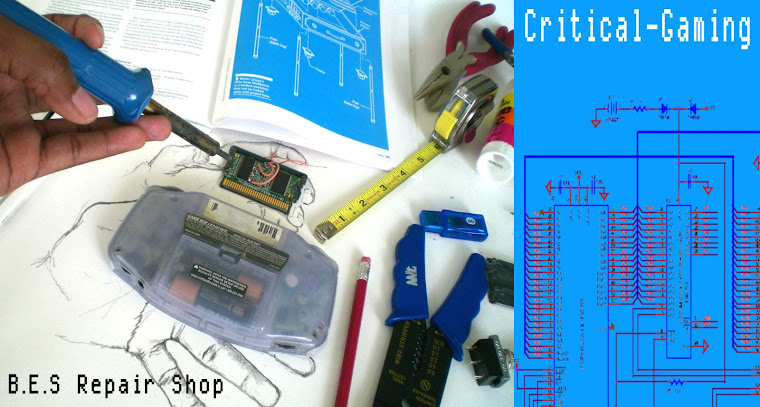- Before I get into today's post, I have a quick update to announce. I'm changing the term negative space to static space. Recently, I had a conversation with the B.E.S crew involving abstract direction, calculus, and semantics. To make a long story short, I lost the battle. So, it's time for a change. The critical-glossary will reflect the update soon.
Now I understand exactly why the DRILL mechanic is the biggest factor holding back Drill Dozer. The way the game is designed, DRILLing creates a lot of static space. The mechanic itself is mechanized and almost digital. Just like a power drill, when you click the button, the drill spins one way. And if you click the other button, the drill spins the other way. This parallel makes clicking the L or R buttons on the GBA direct, intuitive, and dynamic (as far as electric drills go). The problem is, the action of holding a button to activate a power drill isn't very engaging. After a drill is activated, it practically does the work for you. While this quality makes working with power tools easier in real life, in a game world where DRILLing is the most profound and meaningful action (ie. the primary mechanic) the ease and sort of automated gameplay is why Drill Dozer ultimately falls short of greatness.
Most of the interactive/destructible elements in Drill Dozer have a health bar whether it's visible or not. When DRILLing, the drill locks into place as if it were magnetized. Functionally, these design choices creates "set it and forget it" gameplay. In other words, once player connects with a target, which isn't hard due to the ability to aim the drill in all 4 directions, players simply hold down one of the shoulder buttons and wait for the target to be destroyed or the drill to run out of spin power. During this time, static space is created where the player is neither advancing toward the goal nor experiencing an escalating through increased threats or incentives to stop drilling.
Thinking back on it, it's no wonder a rumble pack was included inside every copy of Drill Dozer. The force feedback makes the static space a little more interesting for the player.
Games with health bars and/or projectiles tend to have static space issues as well. Everyday Shooter has this problem to a lesser degree compared to Drill Dozer. Enemies in this game generally take multiple shots, so shooting to kill involves aiming at the target and waiting for it to be destroyed. Of course, the often chaotic levels encourage the player to move around and mix things up.
If you're going to do health bars, then there are ways to incorporated mechanics that add momentum and dynamically changing strategies to counteract the static space. Some bosses/enemies have last resort attacks or techniques that they only bust out when they're below 30% health or so. In Pikmin, some enemies becomes more susceptible to stun attacks when their health bar dips into the yellow and red zones. Of course, because interplay is made up of counters, even the first level of interplay would shift any situation out of its static space.
Geometry Wars has a similar problem with its primary mechanic of SHOOT. Because the player can SHOOT in any direction independently of moving, players can back away safely from most approaching enemies while firing in their wake. The strategies involved in the core gameplay amounts to little more than 1) move away from enemy cluster and 2) shoot at the cluster. In this case, the cluster of enemies functions like one large enemy with a health bar.
Repeating any strategy too many times in a row without the situation escalating (increase of momentum/flow) creates static space. In these situations, players may often say things like "I have the winning strategy, but I still have to keep it up for 20-30 more rounds. What's the point?" My old orchestra director Kevin Lacefield stressed to us repeatedly that whenever a song repeats anything from a single note to a whole passage, we must play the two differently. Whether in dynamics, articulation, speed, energy, or a combination, creating such a difference between two similar musical moments creates motion, and it is this motion that makes music. If you don't believe me, click here, and scroll down to the entry entitled "Piano Concerto 21," and listen to all the subtle and not so subtle changes in the main theme. Trust me, you'll know the main theme when you hear it.
As I have mentioned previously on this blog, attack-attack-heal is a prevalent and often dominant strategy in RPG combat. Such a dominant strategy can easily create static space when fighting formidable enemies. But some RPGs have gotten quite carried away with another feature that undoubtedly increases the amount of static space in the gameplay. Lengthly, excessive, and/or over the top battle animations. This is a particularly infuriating feature in RPGs with random battles, long load times, and cinematic animations for just about everything including watching the combatants phase into the battle zone. After the first 20 times of watching the characters ruuuuuun up, draw their weapon, strike, and do a little pose, we get the picture.
To punctuate the common RPG static space some RPG's like Lost Odyssey, Shadow Hearts, FF8, the Paper Mario RPGs, and the Mario & Luigi RPGs have features where players must carefully time button presses or other inputs methods to increase their attack power or move effectiveness. Simple additions like this go a long way toward keeping the player engaged and focused on the game.
Sometimes it's as easy as pondering, "How can we play this game instead of letting it play itself?"


No comments:
Post a Comment